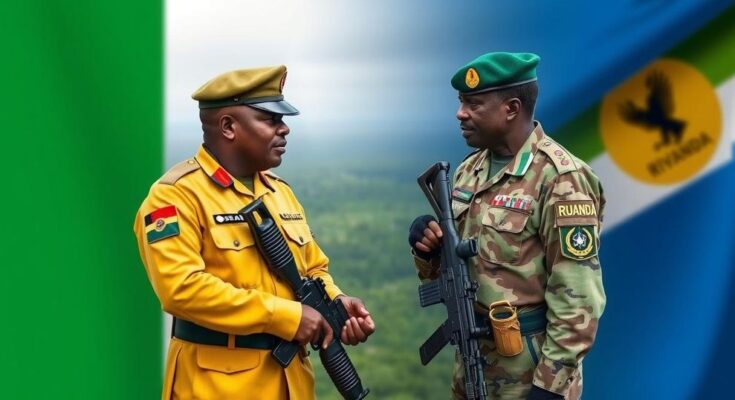The armies of Uganda and Rwanda are efficiently solving cross-border security issues through direct communication between their field commanders, as revealed in a recent meeting in Musanze, Rwanda. Military leaders emphasize the benefits of this approach for bilateral relations and community awareness initiatives aimed at preventing illicit activities further strengthen cooperation.
The armies of Uganda and Rwanda are now effectively addressing cross-border security concerns through direct communication methods such as phone calls and face-to-face meetings between their field commanders. This development was highlighted during the third Proximity Commanders meeting held in Musanze, Northern Rwanda. Maj Gen Vincent Nyakarundi, the Chief of Staff of the Rwanda Defence Force, remarked on the efficiency introduced in resolving these issues, stating that previous lengthy processes involving embassies have been streamlined thanks to the coordination of commanders on the ground.
Lt Gen Kayanja Muhanga, the Commander of Uganda People’s Defence Force (UPDF) Land Forces, also acknowledged the notable enhancement in bilateral relations. He asserted that these meetings have fostered improved cooperation and coordination between the armies, allowing them to address border issues expeditiously.
This progressive approach marks a vital shift in the relationship between Uganda and Rwanda, which had been strained due to allegations of espionage and economic sabotage against one another. The restoration efforts included consultations between Chief of Defence Forces Gen Muhoozi Kainerugaba and Rwandan President Paul Kagame aimed at reinforcing diplomatic ties. The recent meeting focused on implementing measures to prevent negative activities impacting border communities.
Moreover, the gathering emphasized the need for increased awareness and sensitization programs for border communities to combat illicit cross-border activities, including drug trafficking and human smuggling. Participants also visited significant historical sites, including the Kigali Genocide Memorial and the Campaign Against Genocide Museum, to reflect on the events of the 1994 Genocide against the Tutsi, where over one million lives were lost.
The relationship between Uganda and Rwanda has experienced notable tensions, particularly due to accusations of espionage and economic sabotage. However, recent efforts by military leaders from both nations to enhance direct communication have indicated a commitment toward mending bilateral ties. The Proximity Commanders meetings signify a strategic approach to address security concerns without the traditional bureaucracy that delayed resolutions. Engaging with border communities further reflects a holistic strategy towards comprehensive security and cooperation.
In conclusion, the proactive measures introduced by the Ugandan and Rwandan armies to resolve cross-border issues through direct communication mark a significant turn in their bilateral relations. Enhanced cooperation at the command level has facilitated a swifter resolution of security concerns, paving the way for stronger ties. Continued engagements and awareness initiatives underscore a mutual commitment to fostering peace and security in the region, which is essential for stability and growth.
Original Source: chimpreports.com




